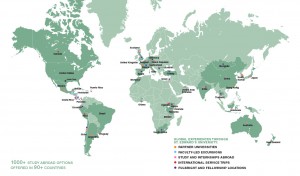UELO: Students will integrate global perspectives and moral reasoning to make personal and professional decisions in pursuit of social justice.
The learning outcome references social justice, so it is helpful to know what people think that concept actually means. The responses were:
- making a difference in our communities
- awareness of inequalities
- understanding how societal structures produce inequalities
- awareness that there is oppression based on identity
- understanding the perspectives of groups that are different from our own & how they might be affected by our decisions
- when making business decisions, make sure that no harm comes to those affected by the decision
- connecting the concept of social justice to globalization, so that it isn’t a U.S. definition of that term
The learning outcome references global perspectives, so it is helpful to know what people think that concept actually means. The responses were:
- understanding how regions developed over time & what issues are important to them
- being knowledgeable about other cultures & religions
- it is a way of understanding ourselves by understanding others (e.g. how does inequality in South America allow us to better understand inequality in the U.S.)
- it needs to be more than just a focus on globalization, which is an important part of international relations, but by no means the only explanation for why countries make certain decisions
Is there a way to integrate these two things in the classroom? An assignment was mentioned where students talk about the issue of climate change framed by moral reasoning. However, are such assignments being done consistently in all ethics courses?
Rather than dictating to all instructors that certain topics must be addressed, it was suggested that we allow the specific learning outcome to guide content creation. The instructor would be aware of the need to embed an assignment or activity within the course to achieve the outcome, but would have flexibility in terms of exactly how to do that.
The CULF 3330 workshops were highlighted as an example of where these two things are being integrated in a meaningful way. It was noted that students are initially resistant to them because they take place outside of class, but are ultimately glad they participated. In particular, they appreciate the decision-making structure of the workshop. I asked why these aren’t done within the classes themselves, and if students could be given the opportunity to participate in more than one. The response was that it would be difficult to coordinate multiple workshops and doing them multiple times might dampen the impact they have on students, so better to explore other high-impact practices for introducing students to global perspectives.
Another workshop had students play an actor in the Syrian crisis. This type of role-playing exercise is effective, but it was suggested that it be done in the actual class, so that curricular content can be tied to the activity. In other words, tighter integration between workshop activities and curricular content is desired.
A project that is done in the International Business course is to have students look at the pros and cons of doing business in an assigned country.
Someone mentioned that we might not actually need courses centered around global perspectives if there were enough workshops and other co-curricular events that educated students. What are Campus Ministry, the Office of International Education, and Student Life doing in this area?
How do we bring the rich cultures of our international students into this ELO? We have such a diverse student body that we should rely on our international students as a resource toward achieving this ELO.
The current general education model starts with inward reflection and then moves outward: self, country, globe.
Is there continuity across the general education curriculum? Could a student complete her studies without encountering these issues?
Problem solving is scaffolded across the curriculum, but is it redundant? In other words, are students basically doing the same thing in multiple courses (e.g. Dilemmas & Capstone papers).
Do instructors in the major see a benefit to the Gen Ed courses? Business does see value in 3330 and 3331 and ethics.
Should we have ethnic studies majors or minors?
There is value in having non-majors teaching courses because it brings an interdisciplinary perspective.

